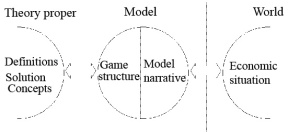One of the best Indian dairy cooperative-based Nobel pun cartoons you’ll see all day. Guest post by Jeff Mosenkis of Innovations for Poverty Action That is Abhijit Banerjee & Esther Duflo above, thanks to Neela Saldanha and Elizabeth Koshy for explaining that Abi Jit means “(He) just won” or “won now,” so it means “just won the Nobel.” And that the dairy cooperative Amul is known in India for their punny billboards (which you can also find on their twitter feed).On the Nobel sugar high,...
Read More »Accumulate, accumulate! That is Moses and the prophets!
Accumulate, accumulate! That is Moses and the prophets! [embedded content] In the postwar period, it has become increasingly clear that economic growth has not only brought greater prosperity. The other side of growth, in the form of pollution, contamination, wastage of resources, and climate change, has emerged as perhaps the greatest challenge of our time. Against the mainstream theory’s view on the economy as a balanced and harmonious system, where...
Read More »A truly distinguished economist who knows what he is talking about
A truly distinguished economist who knows what he is talking about [embedded content]
Read More »‘Nobel prize’ winners Duflo and Banerjee do not tackle the real root causes of poverty
‘Nobel prize’ winners Duflo and Banerjee do not tackle the real root causes of poverty Some go so far as to insist that development interventions should be subjected to the same kind of randomised control trials used in medicine, with “treatment” groups assessed against control groups. Such trials are being rolled out to evaluate the impact of a wide variety of projects – everything from water purification tablets to microcredit schemes, financial literacy...
Read More »The experimental approach to global poverty
The experimental approach to global poverty [embedded content]
Read More »‘Nobel prize’ winner Esther Duflo on how to fight poverty
‘Nobel prize’ winner Esther Duflo on how to fight poverty [embedded content] Today The Royal Swedish Academy of Sciences announced that it has decided to award The Sveriges Riksbank Prize in Economic Sciences in Memory of Alfred Nobel for 2019 to Esther Duflo, Abhijit Banerjee and Michael Kremer. Great choice! In one single stroke the academy doubled the number of women having received the ‘Nobel prize’ in economics. Compared with most other recipients for...
Read More »On the limited applicability of game theory
On the limited applicability of game theory Many mainstream economists – still — think that game theory is useful and can be applied to real-life and give important and interesting results. That, however, is a rather unsubstantiated view. What game theory does is, strictly seen, nothing more than investigating the logic of behaviour among non-existant robot-imitations of humans. Knowing how those ‘rational fools’ play games do not help us to decide and act...
Read More »IPA’s weekly links
Ethiopian Prime Minister and Nobel Laureate Abiy Ahmed Ali Guest post by Jeff Mosenkis of Innovations for Poverty Action Ethiopian Prime Minister Abiy Ahmed Ali has won the Nobel Peace Prize for his work towards peace with Eritrea, though the committee acknowledged it’s still a work in progress. Ethiopia has also loosened some of its more repressive policies around security and journalism recently. Commentary from BBC starting around 6 minutes here (both stories h/t Laura Seay).For longer...
Read More »Teflon economics
At least since the time of Keynes’s famous critique of Tinbergen’s econometric methods, those of us in the social science community who have been impolite enough to dare to question the preferred methods and models applied in quantitative research in general and economics more specifically, are as a rule met with disapproval. Although people seem to get very agitated and upset by the critique — just read the commentaries on this blog if you don’t believe me — defenders of...
Read More »Knut Wicksell’s principle of just taxation
Knut Wicksell’s principle of just taxation My claim is that the very concept of taxation presupposes that all incomes are equally justified. This applies no matter which principle of taxation one wishes to put into practice. A tax that only reduces by a certain amount what a person unjustly possesses cannot be regarded as an appropriate compensation on his part for the efforts the state has made on his behalf, nor can it be seen as a sacrifice comparable...
Read More » Heterodox
Heterodox






